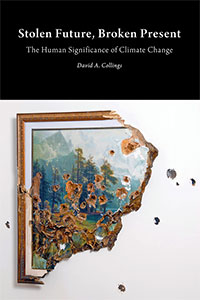Stolen Future, Broken Present: The Human Significance of Climate Change
by David A. Collings

- Critical Climate Change
- Published: 2014
- ISBN: 978-1-60785-314-5
This book argues that climate change has a devastating effect on how we think about the future. Once several positive feedback loops in Earth’s dynamic systems, such as the melting of the Arctic icecap or the drying of the Amazon, cross the point of no return, the biosphere is likely to undergo severe and irreversible warming.
Nearly everything we do is premised on the assumption that the world we know will endure into the future and provide a sustaining context for our activities. But today the future of a viable biosphere, and thus the purpose of our present activities, is put into question. A disappearing future leads to a broken present, a strange incoherence in the feel of everyday life.
We thus face the unprecedented challenge of salvaging a basis for our lives today. That basis, this book argues, may be found in our capacity to assume an infinite responsibility for ecological disaster and, like the biblical Job, to respond with awe to the alien voice that speaks from the whirlwind. By owning disaster and accepting our small place within the inhuman forces of the biosphere, we may discover how to live with responsibility and serenity whatever may come.
Author Bio
David Collings is Professor of English at Bowdoin College, where he teaches courses in British Romanticism, critical theory, sexuality and gender, and environmental studies. He is the author of Stolen Future, Broken Present: The Human Significance of Climate Change at Open Humanities Press, as well as several books on the deformation of cultural practices in the era of British Romantic literature, including Wordsworthian Errancies: The Poetics of Cultural Dismemberment (1994), Monstrous Society: Reciprocity, Discipline, and the Political Uncanny, c. 1780-1848 (2009); Disastrous Subjectivities: Romanticism, Modernity, and the Real (2019); and Blank Splendor: Mere Existence in British Romanticism (2024). He co-edited Queer Romanticisms with Michael O’Rourke (2004-5) and Romanticism and Disaster with Jacques Khalip (2012). He has written articles on laboring with disaster, the poetics of the vanishing commons, the hospitality of oblivion, the undoing of the rainbow covenant, and economies of death. He has served as Chair of the Board of the North American Society for the Study of Romanticism.
